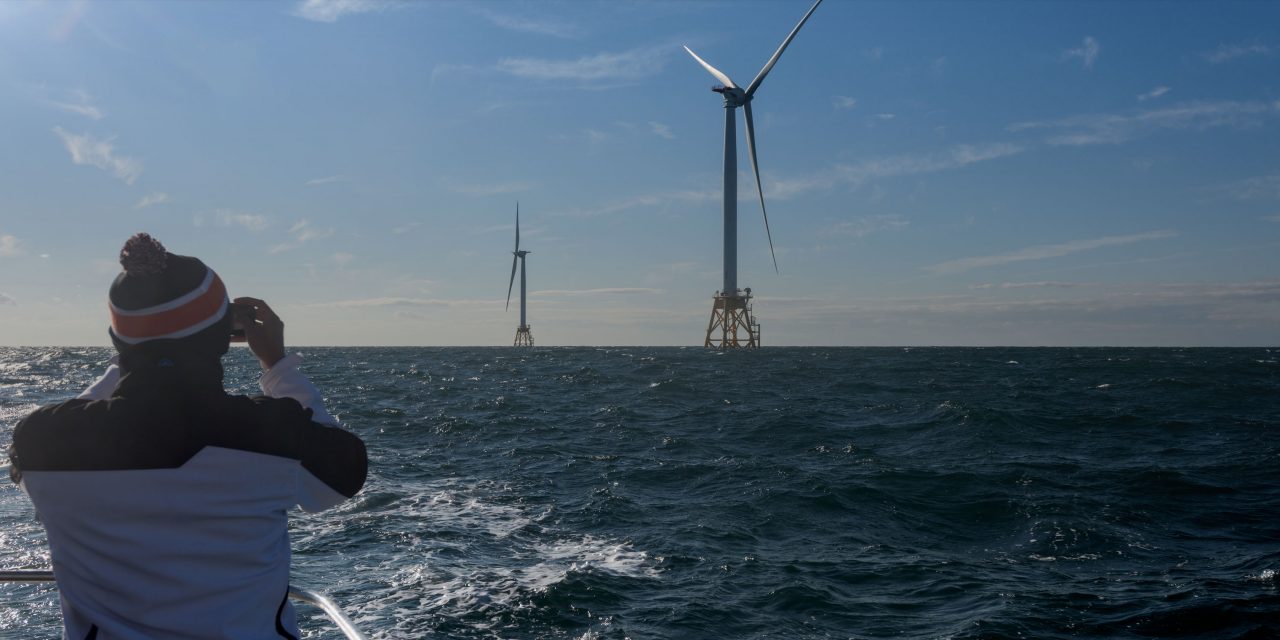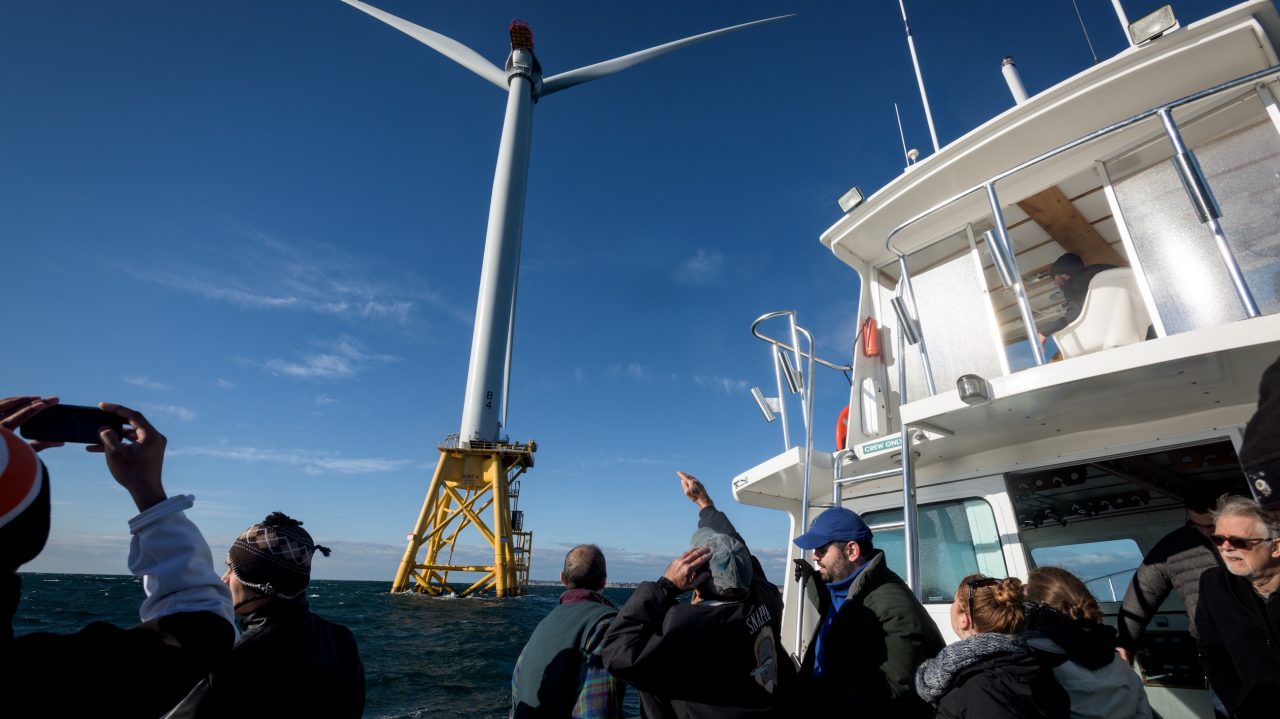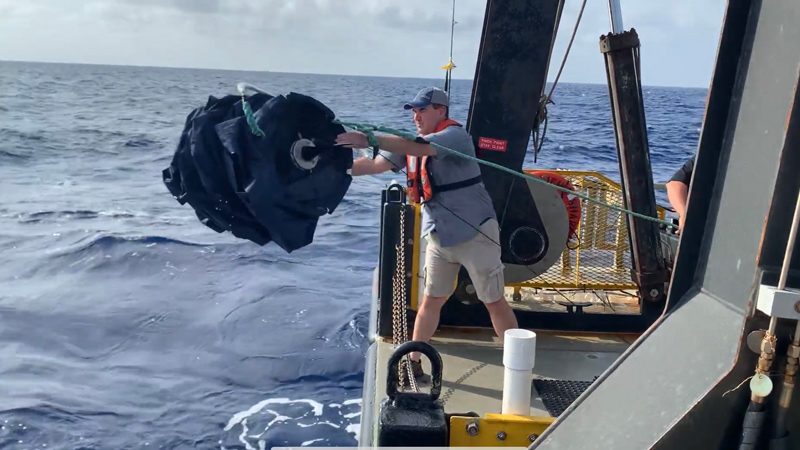
Environmental Science and Management (ESM) Degree Program

Join us for an integrative approach to our common environmental future
Looking to make a real impact on the environment? UD's Master of Science in Environmental Science and Management program may be the perfect fit for you. Our curriculum is designed to provide you with the skills and knowledge you need to address pressing environmental challenges, including climate change, fisheries, land use, and just energy transition.
This program has a rolling admission process. This means that applications will be considered as they arrive with monthly admissions decisions made up until the application deadlines. Final deadlines for submitting an application is May 1 for fall and November 1 for spring.
This professional degree equips students with practical decision-making and management skills applicable to jobs in the environmental sector.
Students select a specialized course track—climate, earth resources or marine—and are assigned an individual faculty advisor. They begin the program in the fall or spring and end the program with a group capstone experience that considers a real-world issue for an outside client, completing the 33-credit degree program in 21 months.
Students admitted to ESM often hold undergraduate degrees in environmental science or studies, natural resource management, biology, geology, marine science, meteorology, economics, policy, planning and sociology.
KEY NUMBERS
21 months
Program duration
$1,116
Cost per credit
33
Credit hours

Students graduating with the Master of Science in ESM will be prepared to become environmental planners, environmental scientists, project managers, and environmental compliance specialists at all levels of government and in the private sector.
| Area | Requirements | Credit Hours | ||
|---|---|---|---|---|
| Management Foundation | ENWC 656 Conservation Biology MAST 672 Benefit-Cost Analysis MAST 675 Natural Resource Economics UAPP 690 Seminar: Public Administration UAPP 701 Public Policy Analysis UAPP 706 Planning Sustainable Communities and Regions |
3 | ||
| Environmental Science Foundation | ENSC 601 Fundamentals of Environmental Science | 3 | ||
| Data Analysis | Choose two: GEOG 604 GIS for Environmental Research GEOG 605 Computer Programming for Environmental Research GEOG 660 Statistics for Earth Sciences GEOG 662 Spatial Statistics GEOG 671 Advanced Geographic Information Systems GEOG 688 Spatial Data Analysis and Modeling MAST 669 Statistics for the Marine Sciences SPPA 704 Advanced Quantitative Methods SPPA 721 Data Science Tools for Evidence-based Policy |
6 | ||
| Science-Management Connections | Choose one: MAST 610 Coupling Human to Natural Systems MAST 628 Offshore Wind Power (must be taken for 3 credits) |
3 | ||
| Marine Science Track | Pick two science courses: MAST 602 Physical Oceanography MAST 609 The Ocean and Climate Change MAST 621 Coastal Field Biology MAST 627 Biological Oceanography MAST 637 Geological Oceanography MAST 646 Chemical Oceanography Pick two management courses: MAST 628 Offshore Wind Power: Science, Engineering and Policy MAST 662 Climate Change: Policy, Equity and Mitigation MAST 674 Legal Aspects of the Coastal Zone MAST 676 Environmental Economics SPPA 614 Environmental Justice in Disasters |
12 | ||
| Climate Science Track | Pick two science courses: CLIM 631 Fundamentals of Climate Change GEOG 612 Physical Climatology GEOG 613 Wind Power Meteorology GEOG 617 Seminar in Climate Change GEOG 632 Environmental Hydrology GEOG 652 Seminar in Climatology GEOG 656 Hydroclimatology GEOG 657 Climate Dynamics GEOG 658 Paleoclimatology MAST 609 The Ocean and Climate Change Pick two management courses: ENEP 626 Climate Change: Science, Policies & Political Economy GEOG 616 Climate Fiction, Science and Communication GEOG 619 Climate Change Adaptation Policy and Practice GEOG 634 Plan Sustainable Communities and Regions MAST 639 Renewable Energy and Climate: Law, Regulation, and Environment MAST 662 Climate Change: Policy, Equity and Mitigation MAST 688 Climate Change Economics SPPA614 Environmental Justice in Disasters |
12 | ||
| Earth Resources Track | Pick two science courses: GEOL 612 (1 credit) Geology of Strategic Mineral Deposits and GEOL 613 (2 credits) Analytics of Minerals for Risk Management GEOL 621 Environmental and Applied Geology GEOL 628 Hydrogeology GEOL 648 Ecohydrology GEOG 632 Environmental Hydrology PLSC 640 Field Methods in Soil-Water-Air PLSC 621 Nonpoint Source Pollution Pick two management courses: MAST 676 Environmental Economics GEOG 622 Resources Development and the Environment UAPP 611 Regional Watershed Management APEC 820 Experimental Economics GEOG 655 (1 credit) Certification Systems for Sustainable Development and GEOG 669 (2 credits) Minerals and Ecological Economics SPPA614 Environmental Justice in Disasters |
12 | ||
| Capstone Experience or Analytical Paper |
Required: MAST 663 Decision Tools for Policy Analysis and Capstone Experience MAST 664 Environmental Issue Capstone or Analytical Paper MAST 865 MMP Analytical Paper |
6 | ||
| TOTAL CREDIT HOURS | 33 |
A full-time academic load is 9 credits hours per semester for each semester. All required coursework is completed in two years. The program is described for full-time students, but students may participate in a part-time capacity, which would influence time-to-degree.
Normal, full-time progress (capstone option) follows the schedule below.
| Year 1 | Year 2 |
|---|---|
| Fall (9 credit hours) ENSC 601 Fundamentals of Environmental Science MAST 675 Natural Resource Economics MAST 610 Coupling Natural and Human Systems or MAST 628 Offshore Wind Power |
Fall (9 credit hours) MAST 663 Decision Tools for Policy Analysis Track Elective 2 or Data Analysis Elective 2 Track Elective 3 |
| Spring (9 credit hours) Data analysis elective 1 Track Elective 1 Track Elective 2 or Data Analysis Elective 2 |
Spring (9 credit hours) MAST 664 Environmental Issue Capstone Track Elective 4 |
The capstone is a central part of the student experience. It is designed to address a specific real-world policy problem and is sponsored by an outside client. Students work in small groups on the assigned project using skills and knowledge acquired in the classroom. The outside sponsor can be at the local, national, or international level and might, for example, include agencies such as Delaware’s Department of Natural Resources and Environmental Control, the U.S. Environmental Protection Agency, the U.S. Department of the Interior, the World Bank, or the Food and Agriculture Organization of the United Nations. At the beginning of your second year, ESM faculty will find sponsors who need a talented group of graduate students to assist them with a real-world project that can be completed in one semester. Deliverables could include a report, presentation, budget, or work plan. Sponsors change from year to year. Each capstone group will be advised by at least one ESM faculty member.
Capstones reflect the applied nature of this program and will prepare students for working in government, non-profit, and for-profit organizations. It is a 3-unit course (MAST 664 Environmental Issue Capstone) in your last semester. The capstone course is only open to students in the MS in Environmental Science and Management and the MS in Environmental Economics. Students entering the capstone course will be required to take Decision Tools for Policy Analysis, MAST 663/UAPP 663, in the preceding semester. Capstone projects will develop and build practical research, collaboration, and communication skills that employers value.
Analytical Paper option
In special circumstances (e.g., if interested in seeking a research experience and continuing to a PhD), a student may write an analytical paper—an article-length paper targeting publication in an appropriate peer-reviewed journal—in lieu of the capstone experience. To do so, the student however must secure the approval of a CEOE-affiliated faculty member to offer guidance, direction, and development of the paper. The paper is evaluated by the faculty research advisor, although actual publication is not required.
Admitted students will be required to select a track within the ESM degree. The three tracks are climate science, earth resources, and marine science.
Climate science track

Mitigation such as offshore wind power, adaptation to climate including sea level rise, and weather extremes
| Year 1 example curriculum |
|---|
| Fall (9 credit hours) ENSC 601 Fundamentals of Environmental Science MAST 675 Nat Resource Economics MAST 610 Coupling Natural & Human Systems or MAST 628 Offshore Wind Power |
| Spring (9 credit hours) GEOG 604 GIS for Environmental Research SPPA 704 Advanced Quantitative Methods GEOG 612 Physical Climatology |
| Year 2 example curriculum |
|---|
| Fall (9 credit hours) MAST 663 Decision Tools for Policy Analysis MAST 609 The Ocean and Climate Change GEOG 619 Climate Change Adaptation |
| Spring (9 credit hours) MAST 664 Environmental Issue Capstone ENEP 626 Climate Change: Science, Policies and Political Economy |
Earth resources track

Hydrology, environmental geology and critical minerals
| Year 1 example curriculum |
|---|
| Fall (9 credit hours) ENSC 601 Fundamentals of Environmental Science MAST 675 Natural Resource Economics MAST 610 Coupling Natural & Human Systems or MAST 628 Offshore Wind Power |
| Fall (9 credit hours) ENSC 601 Fundamentals of Environmental Science MAST 675 Natural Resource Economics MAST 610 Coupling Natural & Human Systems or MAST 628 Offshore Wind Power |
| Year 2 example curriculum |
|---|
| Fall (9 credit hours) MAST 663 Decision Tools for Policy Analysis PLSC 621 Nonpoint Source Pollution GEOG 632 Environmental Hydrology |
| Spring (9 credit hours) MAST 664 Environmental Issue Capstone MAST 676 Environmental Economics |
Marine science track

Fisheries, offshore wind power, sea level rise, and coastal land use
| Year 1 example curriculum |
|---|
| Fall (9 credit hours) ENSC 601 Fundamentals of Environmental Science MAST 675 Natural Resources Economics MAST 610 Coupling Natural and Human Systems or MAST 628 Offshore Wind Power |
| Spring (9 credit hours) SPPA 704 Advanced Quantitative Methods GEOG 604 GIS for Environmental Research MAST 662 Climate Change: Policy, Equity and Mitigation |
| Year 2 example curriculum |
|---|
| Fall (9 credit hours) MAST 663 Decision Tools for Policy Analysis MAST 621 Coastal Field Biology MAST 676 Environmental Economics |
| Spring (9 credit hours) MAST 664 Environmental Issue Capstone MAST 609 The Ocean and Climate Change |
Capstone highlights
The culminating experience for students in the ESM program is their capstone project, where they tackle a real-world project for a client. Our most recent graduated cohort requested to work with the National Oceanic and Atmospheric Administration (NOAA).

In Fall 2024, Dr. Steve Thur, UD alumnus and Assistant Administrator for Oceanic and Atmospheric Research and Acting NOAA Chief Scientist, agreed to be the Capstone client for the ESM degree program. He requested our Capstone class to write an independent report on developing best practices for community engagement in marine carbon dioxide removal (mCDR) research.
Four students, Lannis Dodge, Christina Marchak, Travis Pluck, and Kayla Rexroth, presented their database and final report to Dr. Thur's office and the NOAA Research Ocean Acidification Program at NOAA Headquarters in Silver Spring, Maryland on May, 9, 2025. They also spent the day at NOAA visiting with staff from NOAA Science on a Sphere, NOAA Office of Habitat Conservation, NOAA Climate Program Office, and NOAA Ocean Exploration Research.
